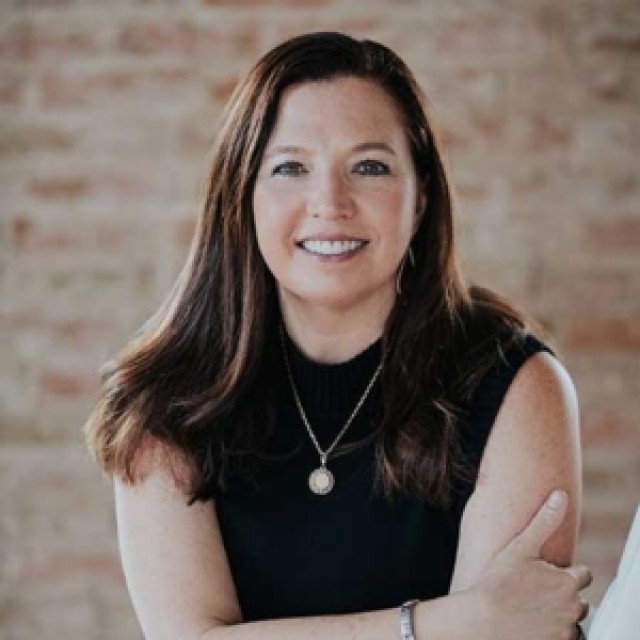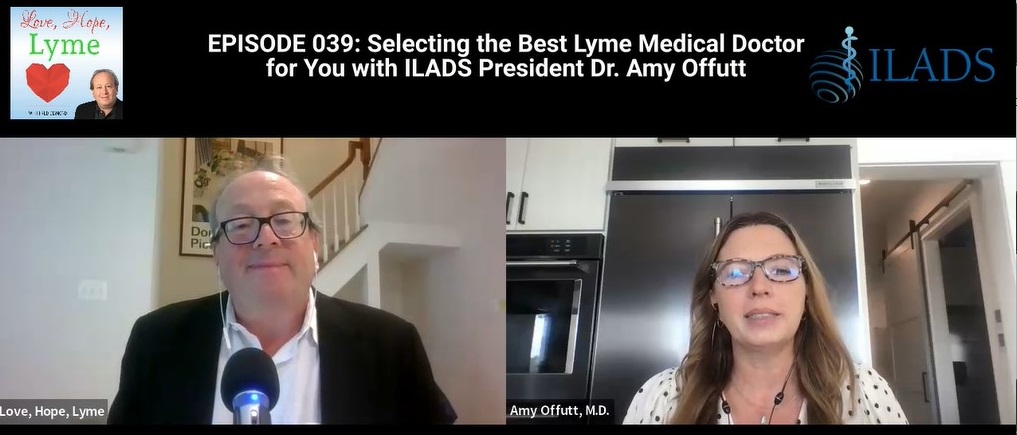PODCAST: Insights from Amy Offutt, MD, on finding the right Lyme doctor

By Fred Diamond
When I was writing my book “Love, Hope, Lyme: What Family Members, Partners, and Friends Who Love a Chronic Lyme Survivor Need to Know,” I did not know there were challenges educating medical professionals to treat and care for Lyme disease survivors.
Lyme disease can be a complex and often misunderstood illness. For those dealing with it, finding a knowledgeable and compassionate doctor can be crucial to healing optimally.
The most recent Love, Hope, Lyme podcast features Dr. Amy Offutt, president of the International Lyme and Associated Diseases Society (ILADS).
She has spent her career educating doctors and treating patients with chronic Lyme disease. In this article, we’ll explore her ideas for Lyme disease survivors on finding the right medical doctor.
Lyme disease is often overlooked
One of the biggest challenges in diagnosing and treating Lyme disease is the general lack of awareness and education among healthcare providers.
Dr. Offutt explains, “A lot of the medical community in the United States is not well-informed about what could be considered in a thorough differential diagnosis when assessing a long-suffering patient. That comes from some of our training, some of what’s emphasized and what’s not emphasized.”
Lyme disease often presents with symptoms that can be mistaken for other conditions, leading to misdiagnosis or delayed treatment.
Finding a doctor who understands Lyme disease is essential, particularly one who recognizes the nuances of chronic Lyme, which many traditional healthcare systems unfortunately overlook.
Why you need a Lyme-literate doctor
Dr. Offutt highlights the significance of Lyme-literate medical doctors (LLMDs), a term that emerged over a decade ago. LLMDs are physicians who have taken the time to educate themselves on Lyme disease and related conditions. They are typically well-versed in recognizing symptoms and diagnosing Lyme disease, even when standard tests return negative results.
“(When) I first heard the term Lyme literate medical doctor about 10 or 11 years ago, I was intrigued by it because I think doctors, we all think we’re very literate in everything… but we’re not all informed,” she says.
Finding a doctor who is Lyme-literate is critical. While many physicians may be unfamiliar with chronic Lyme or resistant to accepting it as a legitimate diagnosis, LLMDs are committed to understanding the disease and offering patients the care they need, she said.
When searching for a doctor to treat Lyme disease, it’s essential to find someone who not only has the necessary medical knowledge but also a caring disposition. Dr. Offutt emphasizes the importance of finding a doctor who genuinely listens and cares about the patient’s well-being:
“The target doctor is the doctor who smiles at you and sits with you when you walk in the room, that actually has a good listening ear, that seems to care about you. If you find that doctor… I will make time to talk to a doctor who’s newly interested, who has a caring disposition and wants to learn more.”
She continued that doctors who are burned out or overstressed may not have the time or energy to take on complex cases like chronic Lyme. However, a doctor who takes the time to listen, ask detailed questions, and consider all possible causes for symptoms can make a world of difference in a patient’s treatment journey.
The role of ILADS
ILADS, the organization Dr. Offutt leads, plays a key role in educating doctors and clinicians about Lyme disease. Their mission is to bridge the gap in knowledge and help medical professionals provide better care for patients suffering from tick-borne diseases.
ILADS will hold its 2024 ILADS Annual Scientific Conference on November 7-10 in San Antonio, TX.
“ILADS is trying to come into the picture and offer more education for more doctors who are interested in trying to figure these patients out better and give them the care that can help them get well or at least get some quality of life back,” Dr. Offutt explained.
Patients searching for a doctor with expertise in Lyme disease should consider asking if their potential physician is a member of ILADS or has attended any ILADS conferences. Doctors who are active in organizations like ILADS are more likely to be equipped to handle complex Lyme cases.
Integrative medicine: a holistic approach
Dr. Offutt’s journey into Lyme disease treatment began when she realized that the traditional medical model wasn’t enough to help many of her patients. She decided to pursue further education in integrative medicine, which focuses on combining conventional treatments with complementary therapies to address the whole person.
“Integrative medicine is conventional medicine married to a bigger toolbox. I think it’s harming our patients if we criticize either side of that fence,” Dr. Offutt explains. “We need to be able to come together to care for the patients in front of us and use whatever tools we need to help them have better quality of life.”
Patients with Lyme disease often benefit from a more holistic approach, where doctors consider not only medications but also lifestyle factors, nutrition, and alternative therapies to support the immune system and reduce inflammation.
The testing conundrum
One of the reasons why Lyme disease is so often misdiagnosed or dismissed is the current limitations of testing. Traditional Lyme tests can be unreliable, leading to false negatives and leaving patients without a proper diagnosis. Dr. Offutt points out the need for doctors to rely on more than just tests when evaluating patients:
“No test is a hundred percent accurate. I’m not saying that the tests we use are great by any means. There are some good tests out there that are still trying to get enough data points and enough use to be able to be used on a larger scale.”
Doctors who treat Lyme disease should take a comprehensive approach, using clinical suspicion and a thorough patient history to make a diagnosis, even if tests come back negative.
Advocate for yourself
Finally, Dr. Offutt offers advice to patients who may feel frustrated by the difficulty of finding a doctor who understands their condition. She encourages patients to seek out a doctor who listens and remains patient in their quest for care:
“If you are sick and you’ve been sick a long time and you haven’t found a doctor that listens and can help, find another doctor. If you can find one that has a caring personality and caring disposition and seems to give you a listening ear, that might be the right one.”
While it can be discouraging to encounter doctors who don’t recognize Lyme disease as a chronic condition, persistence and finding the right match can make all the difference.
Finding the best medical doctor for Lyme disease can be a challenge, but it’s not impossible. By seeking out a Lyme-literate doctor, preferably one involved in organizations like ILADS, patients can find a healthcare provider who understands the complexities of Lyme disease.
Dr. Offutt’s approach to care emphasizes the importance of a holistic, patient-centered model, where listening, compassion, and a willingness to explore all options are key to helping patients regain their health. In the end, the right doctor is not just one who knows the science but one who genuinely cares.
Click here to listen to all episodes of the Love, Hope, Lyme Podcast or on YouTube.
Fred Diamond is based in Fairfax, Virginia and can be contacted via Facebook. His popular book, “Love, Hope, Lyme: What Family Members, Partners, and Friends Who Love a Chronic Lyme Survivor Need to Know” is available on Amazon. The e-version of the book is always free to Lyme survivors. PM Fred on Facebook for your copy.





















We invite you to comment on our Facebook page.
Visit LymeDisease.org Facebook Page